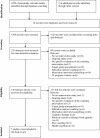Can life coaching improve health outcomes?--A systematic review of intervention studies
- PMID: 24148189
- PMCID: PMC4015179
- DOI: 10.1186/1472-6963-13-428
Can life coaching improve health outcomes?--A systematic review of intervention studies
Abstract
Background: In recent years, coaching has received special attention as a method to improve healthy lifestyle behaviours. The fact that coaching has found its way into healthcare and may provide new ways of engaging the patients and making them accountable for their health, justifies the need for an overview of the evidence regarding coaching interventions used in patient care, the effect of the interventions, and the quality of the studies published. However, in order to provide a clear definition of the coaching interventions selected for this review, we have found it necessary to distinguish between health coaching and life coaching. In this review, we will only focus on the latter method and on that basis assess the health related outcomes of life coaching.
Methods: Intervention studies using quantitative or qualitative methods to evaluate the outcome of the life coach interventions were identified through systematic literature searches in PubMed, Embase, Psycinfo, and CINAHL. The quality of the methodology was independently assessed by three of the authors using a criteria list.
Results: A total of 4359 citations were identified in the electronic search and five studies were included; two of them were randomized controlled trials and met all quality criteria. The two studies investigating objective health outcomes (HbA1c) showed mixed but promising results, especially concerning the patient group that usually does not benefit from intensified interventions.
Conclusion: Because of the very limited number of solid studies, this review can only present tendencies for patient outcomes and a preliminary description of an effective life coaching intervention.The coaching method used in these studies aims to improve self-efficacy and self-empowerment. This may explain why the studies including disadvantaged patients showed the most convincing results. The findings also indicate that some patients benefit from being met with an alternative approach and a different type of communication than they are used to from health care personnel.In order to get a closer look at what is in the 'black box', we suggest that the description and categorisation of the coaching methods are described more comprehensively, and that research into this area is supplemented by a more qualitative approach.
Figures
References
-
- Peterson DB. In: Evidence based coaching. Stober DR, Grant AM, editor. New Jersey: John Wiley & Sons, Inc; 2006. People are complex and the world i messy: a behavior based approach to executive coaching; pp. 51–77.
-
- Olsen JM, Nesbitt BJ. Health coaching to improve healthy lifestyle behaviours: an integrative review. Am J Health Promot. 2010;13:1–12. - PubMed
Publication types
MeSH terms
LinkOut - more resources
Full Text Sources
Other Literature Sources
Medical
Miscellaneous


